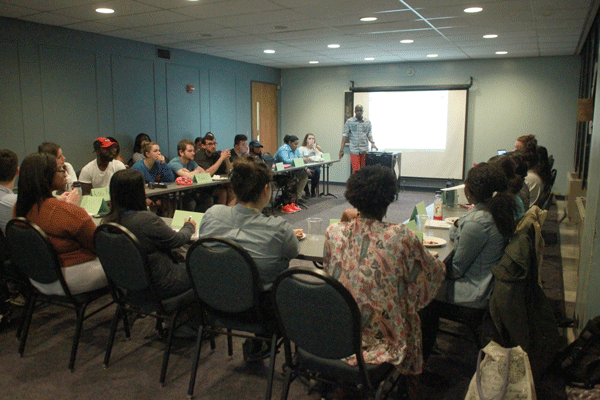
The 60th Student Senate met on Wednesday to discuss the state of mental health affairs on campus.
Vice Senate Chair Cait O’Connor presented her research on various initiatives to improve both the quality and the accessibility of mental health care on campus. Among her list of proposed reforms to the procedures for handling issues of mental health, O’Connor is advocating for the implementation of the Interactive Screening Program (ISP). The ISP would allow students to anonymously complete a survey of their mental health state while offering a variety of options should the student choose to pursue treatment. The 35-question, 10-minute survey would effectively streamline the intake process at the Psychological Counseling Center, according to O’Connor.
At the advisement of Racquel Kissi, the Vice President of Finance, the Senate voted to deactivate the financial account for organizations not recognized by the Student Association (SA). The non-SA account, which was written into the bylaws of the SA constitution last year, was established in order to provide SA-allocated funds to organizations not officially recognized by the SA, including Greek organizations, honors societies, residence hall governments and religious groups.
The funds were transferred to the General Programming account, where they can be accessed by SA-recognized clubs and organizations upon approval by the Budget and Finance Committee.
Esoshani Barton, the Chair for the Council of Organizations, stated in her report that the charters for 17 new clubs were approved at the Council Board meeting on Monday. Among the newly chartered clubs were Her Campus, a student-run online newspaper, and Project HEAL, a community-oriented group seeking to raise awareness and provide support for those suffering from eating disorders.
Senator William Amoyaw reported that the Transportation Implementation committee is seeking to resolve some of the issues regarding vehicular traffic in the village. Most recently, the committee eliminated some of metered parking spaces on the northbound side of Main Street in order to ease the flow of traffic. The committee is also looking to adjust the timing of the traffic signal located at the corner of South Manheim Boulevard and Main Street, next to La Bella Pizza and the New Paltz middle school.
Executive Vice President Kelsey Ryan moderated a debate between the two candidates for New Paltz Town Supervisor. Neil Bettez and Robert Gabrielli, the respective Democratic and Republican nominees, discussed the relationship between the town of New Paltz and the village.
“New Paltz is like a fried egg,” Gabrielli explained, “The village is the yolk in the center, with the campus, and the town surrounds the village like the egg white.” Bettez added that there is some overlap in the jurisdiction, and that he seeks to bring unity to the “factions and fractions of New Paltz.”
The candidates also discussed matters of environmental impact within the town. Ryan inquired of any plans by the town council to implement a ban on plastic bags similar to the one established both on campus and in the village last spring. Gabrielli expressed that the prospect was well-intentioned but unlikely, citing the impracticality of the substitute paper bags used by the village and the campus. In lieu of a total ban on plastic bags, Bettez proposed the establishment of economic incentives, including the distribution of free reusable bags by local businesses and an added tax on the use of plastic bags. According to Bettez, the revenue generated by this proposed tax would then be returned to the town in the form of utilities and services.
“I’m an environmentalist, but you have to expend political capital where it matters,” said Bettez.
